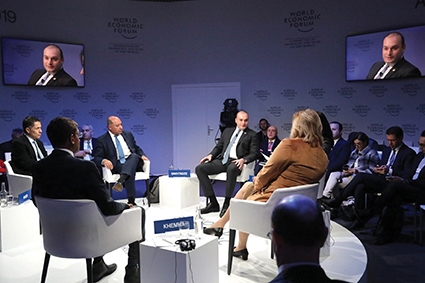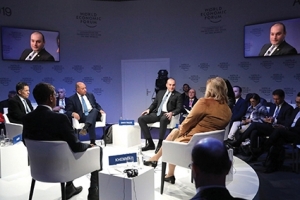WEF 2019 & the Strategic Outlook of Eurasia
On January 23, Georgian Prime Minister Mamuka Bakhtadze participated in discussions on the strategic outlook of Eurasia at the World Economic Forum (WEF) held in Davos, Switzerland.
The discussion ‘Eurasia in a new global context’ focused on economic prospects in the region. The Prime Minister participated in the discussion with the vice chairman of SUN Group, a Dean and Professor from the School of International Relations, the Austrian Minister of Foreign Affairs and Integration, and the President of the European Bank for Reconstruction and Development (EBRD).
During the talk, Bakhtadze underlined the regional importance of Georgia due to its location at the crossroads of Europe and Asia. “We regard ourselves as a bridge from Europe to Asia,” he said. “Our historical roots are European and our outlook is European. But at the same time, Georgia is located at a crossroads of civilizations. We would like to facilitate trade between Asia and Europe, between China and the European Union. Georgia is the only country in the region that has a free trade agreement with both the EU and China.”
Thanks to its location at the crossroads of Europe and Asia, Georgia has excellent potential to become a transportation and logistics hub in the region. Bakhtadze mentioned the construction of the Anaklia Deep Sea Port to help Central Asia trade with the rest of the world. This month, the EU pledged a EUR 233 mln investment for the project, which is set for completion in 2020.
When speaking of Georgia’s relations with the West, Bakhtadze underlined the country’s commitment to join the European Union and become a full member of NATO. In addition, he discussed Georgia’s relationship with the US and its importance for security and the economy in Georgia. “The United States is our strategic partner,” he said, “US-Georgia relations are on an all-time high level.”
Despite the economic potential of the region and the strengthening of Georgia’s relationship with the West, stability remains an issue. “Russia is taking aggressive steps against Georgia,” said Bakhtadze, “our answer to this most painful challenge is of course consolidation of our democracy and the rapid and sustainable development of our economy.”
For this reason, Georgia is looking to join NATO to improve stability and predictability in the region, thus making the country more attractive to investors. The Prime Minister sees predictability and stability as key factors to unlocking the high economic value of the region.
However, Vali Nasr, a Dean and Professor at the School of International Relations, highlighted the uncertainty of Georgia’s accession into the EU and NATO. “There are a lot of things up in the air,” he said, going on to state three of those reasons: First, he questions the appetite of the EU to move eastwards given its current circumstances. Secondly, Russian occupation in Ukraine, South Ossetia, and Abkhazia has shown the West’s reluctance to deeply involve themselves with Russia.
Finally, he mentions Turkey’s role in the region. Although Turkey was once moving closer to NATO and Europe, Turkey’s Prime Minister Erdogan now spends more time in Moscow than in any other European city. It is unclear how Turkey would react were Georgia to join the EU and NATO.
Despite potential tensions in the region, the discussions underlined the huge potential there. By developing its infrastructure, diversifying its economy and improving its stability, Georgia could become a successful transport and business hub in the region.
By Amy Jones
Image source: Mamuka Bakhtadze Twitter












